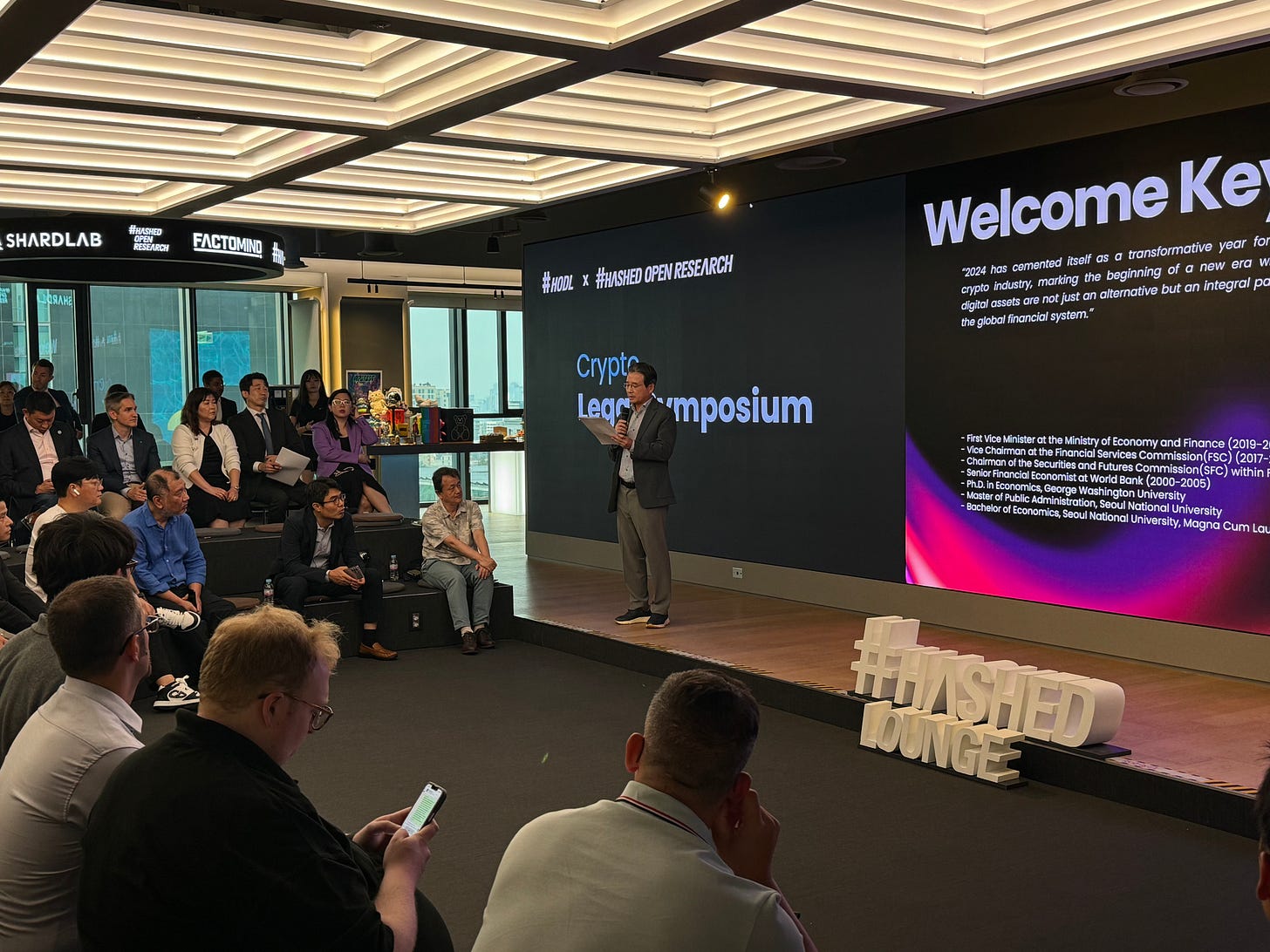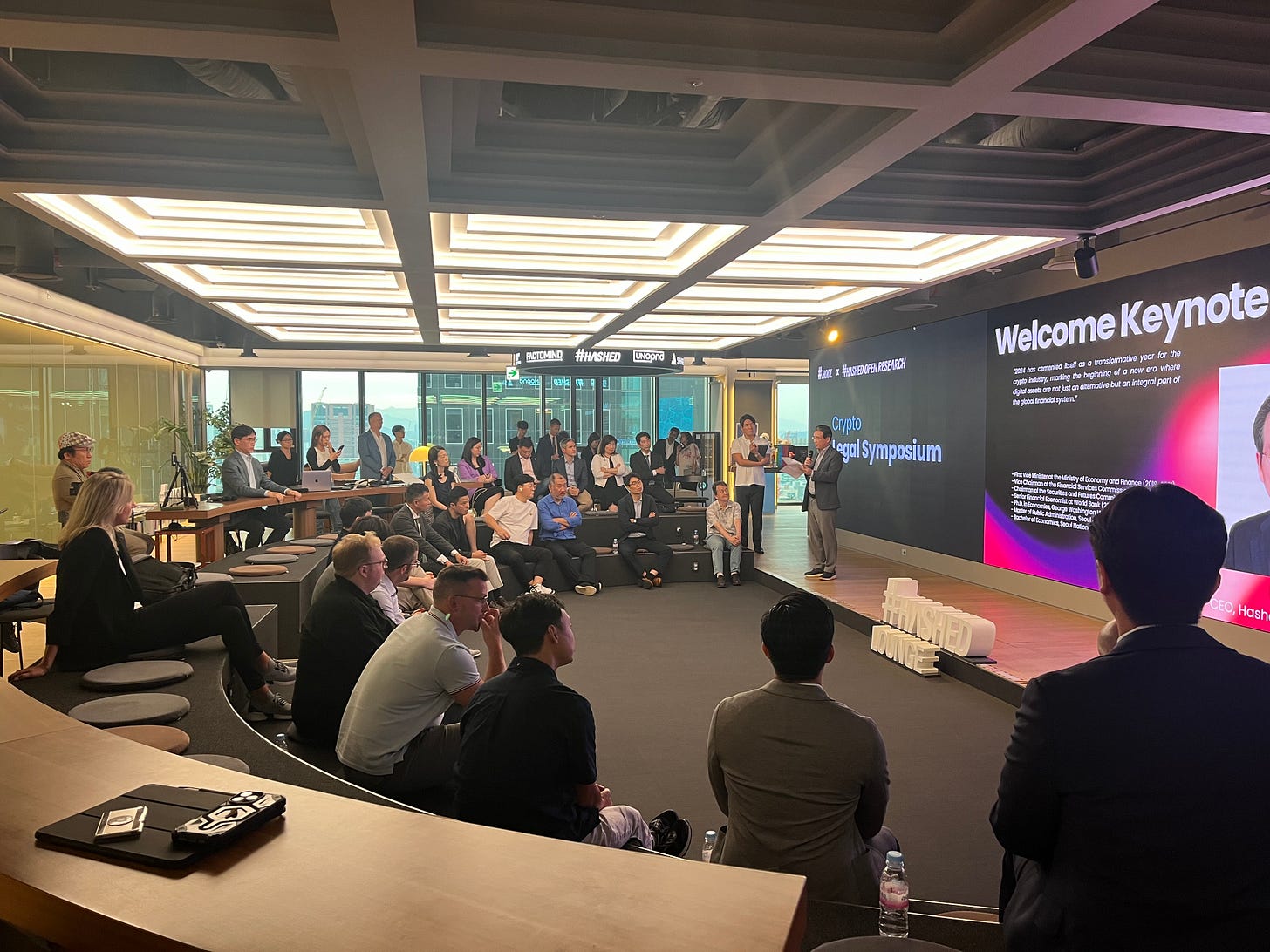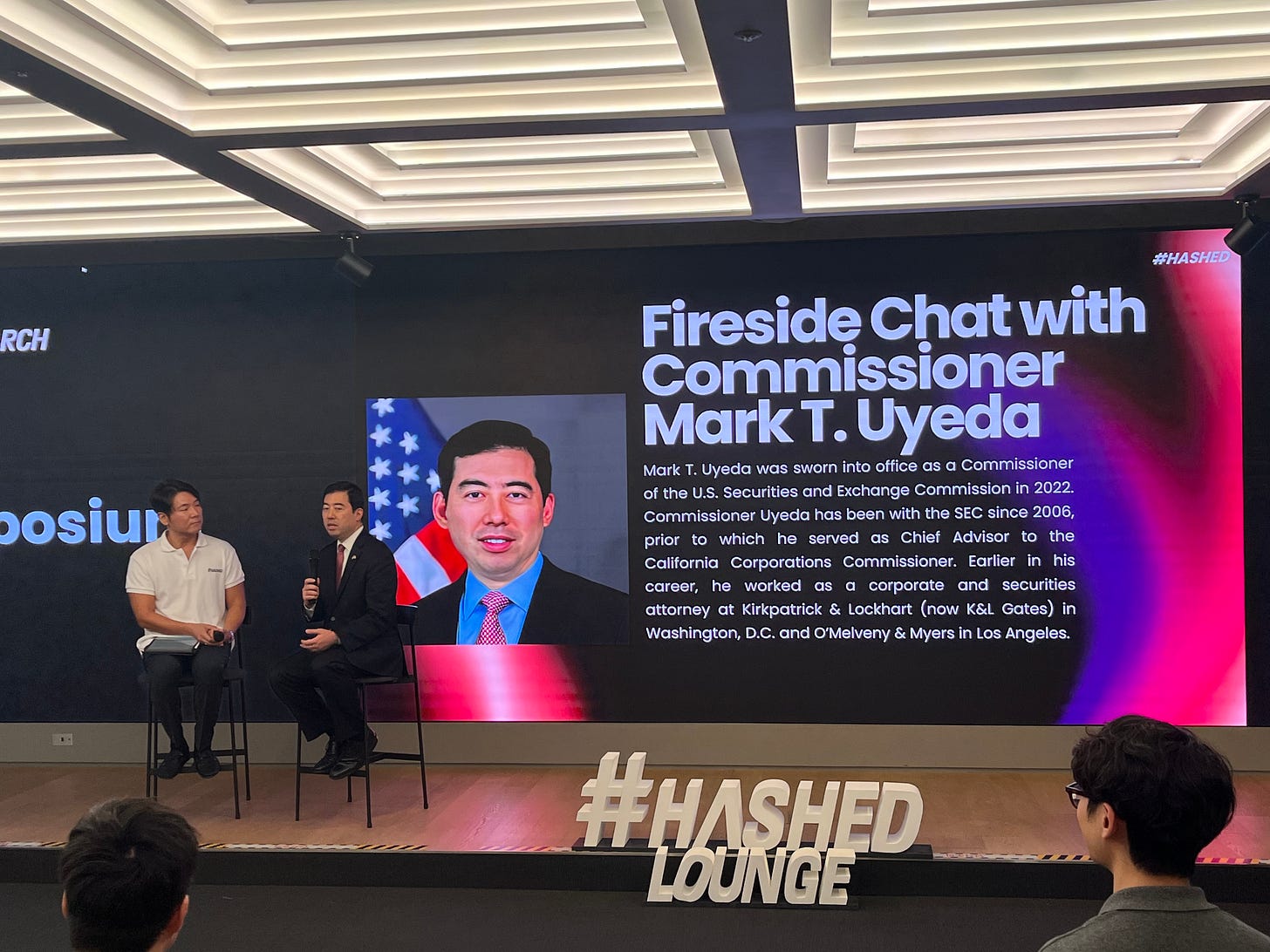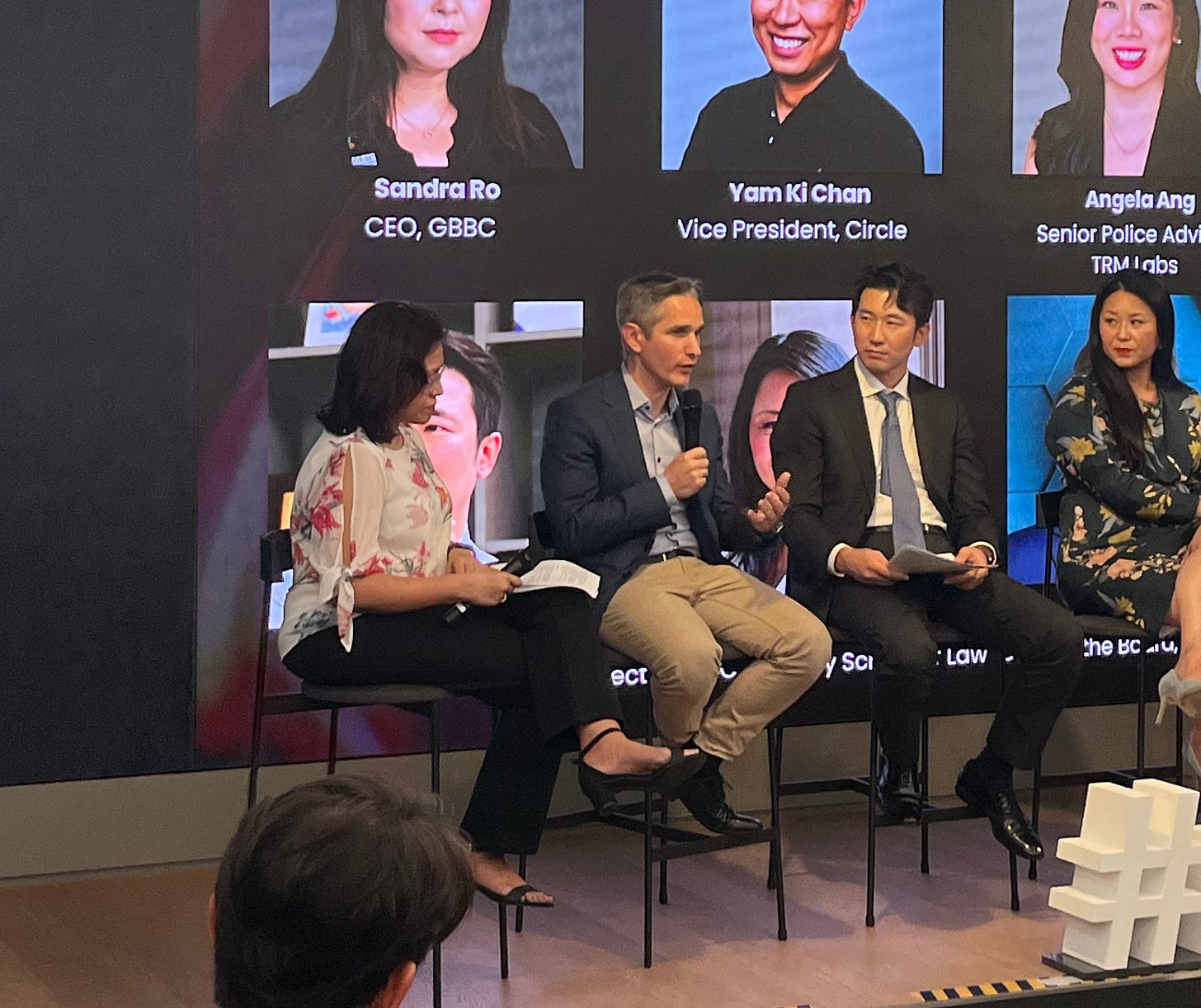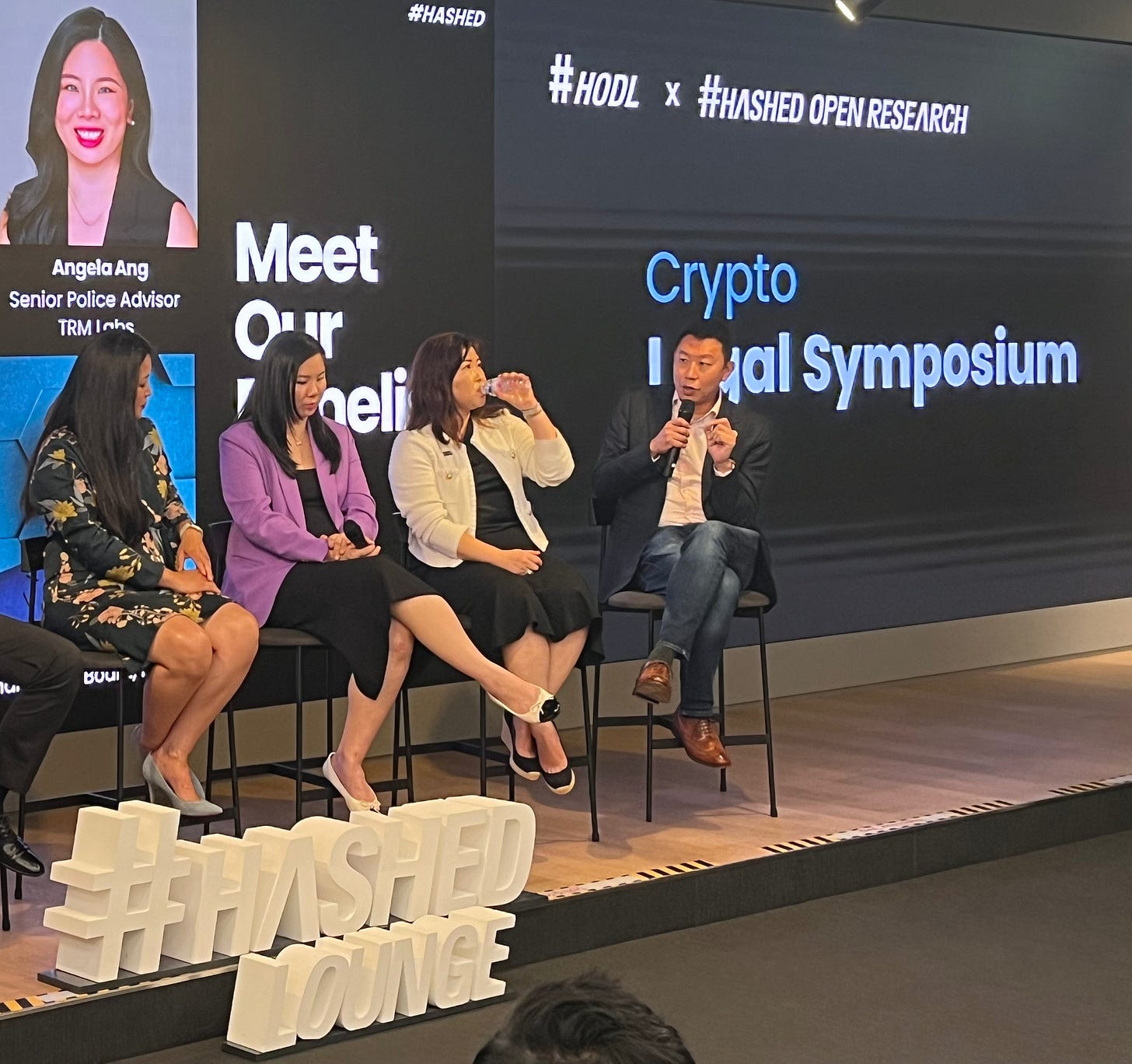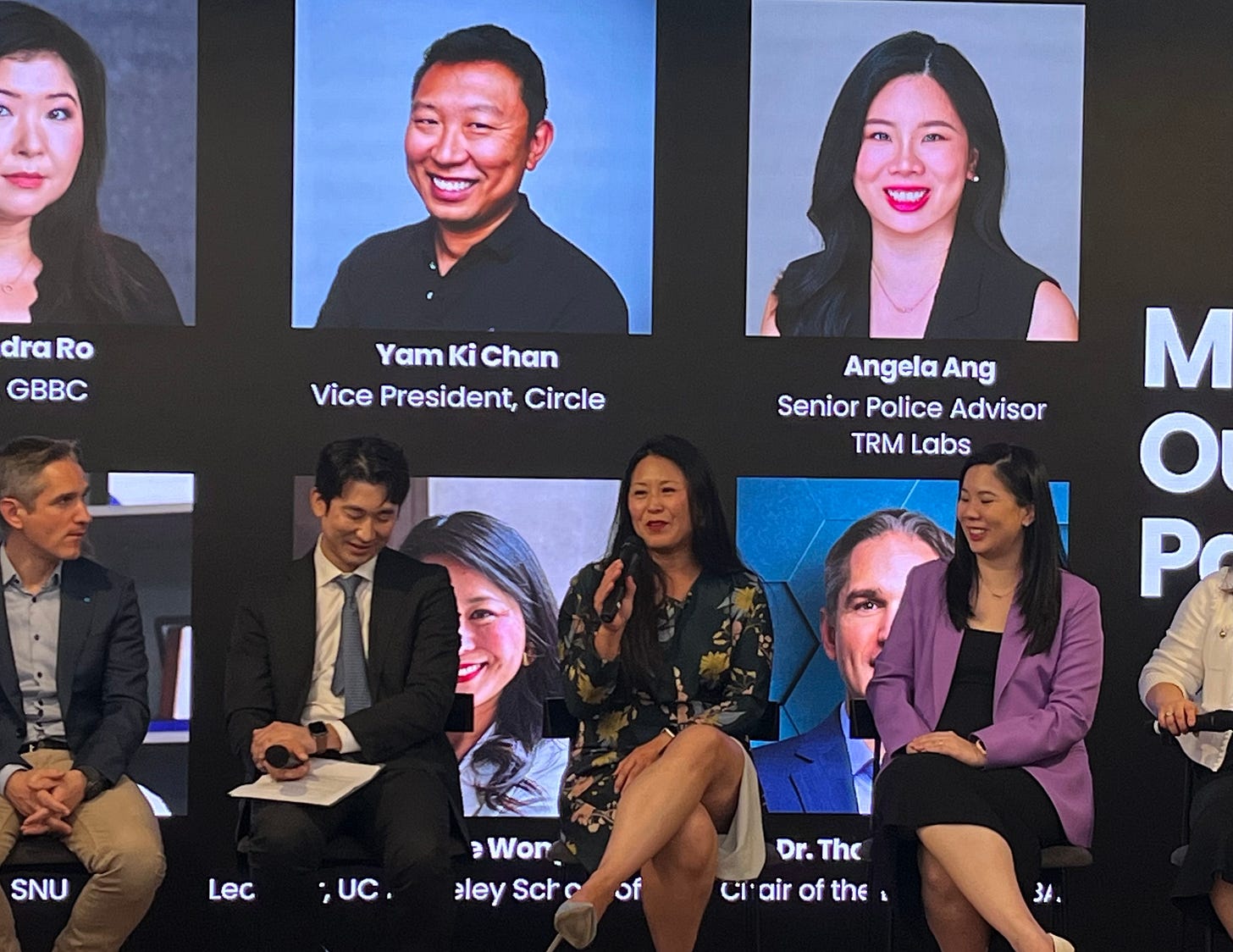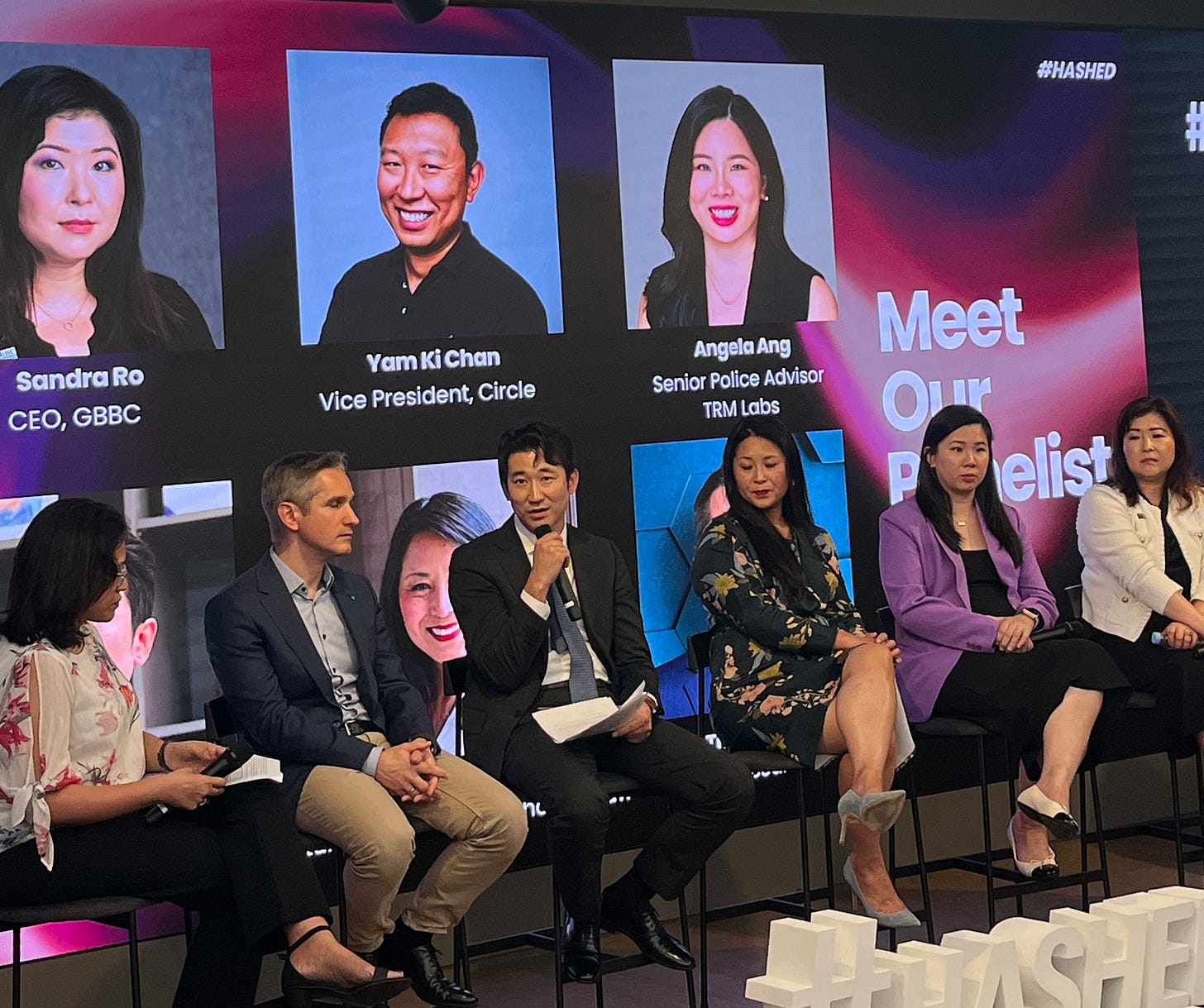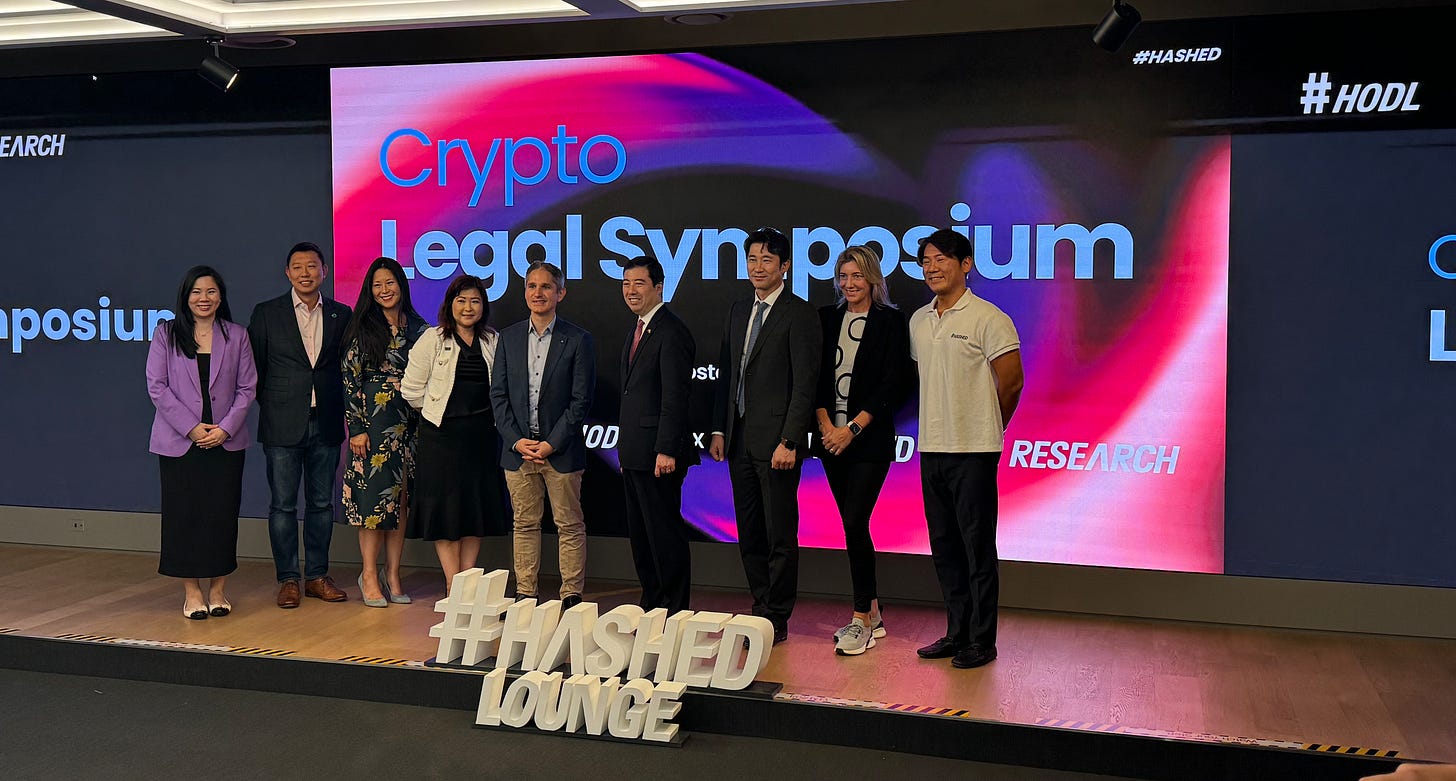CRYPTO LEGAL SYMPOSIUM - KOREA BLOCKCHAIN WEEK 2024
Recap of the Symposium co-hosted by Hashed Open Dialogue for Law (HODL) and Hashed Open Research (HOR) at the Korea Blockchain Week, 2024
On September 2, 2024, the Crypto Legal Symposium took place as part of the Korea Blockchain Week, bringing together some of the most influential voices in the blockchain and crypto space. Hosted by Hashed Open Dialogue for Law (HODL) and co-hosted by Hashed Open Research (HOR), the event offered a unique opportunity for regulators, legal experts, and industry leaders to dive deep into the key legal and regulatory issues facing the world of digital assets.
Here’s a look at what went down at the event.
Welcome Keynote by Dr Yongbeom Kim
Dr. Yongbeom Kim, CEO of Hashed Open Research (HOR), delivered a compelling keynote that framed 2024 as a defining year for the global crypto industry. He began by highlighting the transformative impact of regulatory changes, particularly the approval of the Bitcoin ETF by the U.S. Securities and Exchange Commission (SEC) in January. He noted that this decision signaled a significant shift in the perception of crypto assets as an alternative investment class. While the institutionalization of Bitcoin has been impressive, he also emphasized how the crypto world was taken by surprise when the SEC unexpectedly approved an Ethereum ETF, which marked another milestone in the broader institutional acceptance of crypto assets, underscoring the efforts driving crypto’s growing legitimacy.
Shifting focus to the political stage, Dr. Kim remarked on how the upcoming U.S. presidential election has placed crypto at the center of political discourse. Despite initial skepticism, major candidates now embrace pro-crypto positions, signaling a shift in the broader political narrative. Dr. Kim emphasized that as the number of crypto asset holders increases, political parties can no longer afford to adopt solely restrictive stances, particularly in a climate where voters’ economic interests are increasingly tied to digital assets.
Dr. Kim also drew attention to Japan’s regulatory leadership on the subject. Their proactive approach to regulating the space has allowed Japan to become one of the first countries to establish a regulatory framework for stablecoins in 2022. Since then, the country has continued to advance the growth of the industry through relatively clear regulations. These policies have created a stable environment for innovation, serving as a model for countries like South Korea, which recently implemented its own Virtual Asset User Protection Act.
In closing, Dr. Kim addressed the growing economic vulnerabilities in traditional systems, particularly the rising debt levels in advanced economies like the United States. He suggested that as fiscal crises deepen, crypto assets, especially Bitcoin, may offer an alternative to traditional financial systems, attracting more attention from investors seeking stability. South Korea, he noted, is closely monitoring these global trends and taking deliberate steps to build a balanced regulatory framework. The new virtual asset legislation in Korea, coupled with other ongoing efforts reflects a forward-thinking approach.
Fireside Chat with SEC Commissioner Mark Uyeda
The SEC’s Regulatory Approach to Crypto
Hashed’s Global Head of Legal, Jin Kang, engaged in an informative fireside chat with Commissioner Mark Uyeda of the United States Securities and Exchange Commission (SEC). Commissioner Uyeda opened the conversation by discussing the SEC’s regulatory stance toward digital assets. While the SEC, under Chair Gary Gensler, has taken a strict view of cryptocurrencies, regarding many as securities under existing laws, Commissioner Uyeda presented a more balanced approach. He emphasized the need for regulatory clarity, expressing concern that the agency’s current reliance on enforcement actions without providing clear guidance has created uncertainty for the industry. He outlined his belief that the SEC should take into account the unique aspects of digital assets rather than applying a one-size-fits-all approach to regulation. His view stands in contrast to the agency’s overall posture, which tends to lean heavily on the application of traditional securities laws.
Critique of ‘Regulation by Enforcement’
Commissioner Uyeda discussed one of the biggest criticisms levied at the SEC: the use of “regulation by enforcement.” He acknowledged the frustration within the crypto industry regarding the agency’s focus on punitive measures, which many argue does little to provide clarity or establish a constructive regulatory environment. Commissioner Uyeda highlighted the risks of stifling innovation, pointing out that businesses need clear, proactive guidelines rather than reacting to enforcement actions after the fact. He called for more transparent and forward-thinking regulation that works in concert with the industry, rather than the aggressive enforcement actions that have dominated the SEC’s approach.
Balancing Innovation with Investor Protection
A key issue raised during the conversation was the SEC’s challenge of balancing innovation with investor protection. Commissioner Uyeda emphasized that while protecting investors remains a core mandate of the SEC, there should be more room to encourage innovation. He expressed concern that the agency’s current approach may be too conservative, potentially stifling the development of cutting-edge technologies. He mentioned that the SEC could very well maintain robust investor protection while fostering a regulatory framework that allows digital assets and blockchain technology to flourish. His perspective highlights the tension within the agency between promoting innovation and maintaining a cautious and protective stance.
The Role of Congress in Shaping Crypto Regulation
Commissioner Uyeda pointed out that the uncertainty surrounding crypto regulation in the U.S. is partly due to the lack of clear legislative direction from Congress. He explained that while the SEC is tasked with enforcing existing laws, the current framework was not designed with digital assets in mind. He suggested that comprehensive legislation would be key to resolving the ambiguities the industry faces today. He emphasized that without such legislative clarity, the SEC would continue to rely on its interpretation of existing laws, which could lead to more enforcement actions. Commissioner Uyeda expressed hope that Congress would eventually step in to create a more coherent and industry-friendly regulatory framework.
Navigating the SEC’s Regulatory Environment
While answering a question from the audience, Commissioner Uyeda offered practical advice for crypto companies trying to navigate the SEC’s regulatory landscape. He encouraged firms to engage directly with the SEC through available resources, such as submitting comment letters, to seek clarity on compliance issues before facing enforcement actions. He acknowledged that while the agency’s processes might seem opaque or difficult, open dialogue with regulators is essential for reducing uncertainty. Commissioner Uyeda also underscored the importance of companies being proactive in understanding how securities laws might apply to their operations. He emphasized that early engagement with regulators could prevent costly enforcement actions and help companies stay compliant.
Panel Discussion Recap: The Future of Crypto Regulation Globally and Decentralized Finance
Following the fireside chat, a panel discussion kicked off with Sandra Ro, Thomas Nägele, Yam Ki Chan, Hermine Wong, Jongsub Lee, and Angela Ang which was moderated by Medha Srivastava, General Counsel at Hashed. The panelists brought their unique blend of legal expertise and technical knowledge to the panel, offering valuable insights to the participants.
Sandra Ro
Sandra Ro, CEO of the Global Blockchain Business Council (GBBC), discussed the complexities of regulation, acknowledging that while a universal regulatory framework would be ideal, it's simply not realistic due to the different legal and cultural landscapes across jurisdictions. She highlighted the importance of starting with common ground, particularly in creating shared definitions and taxonomies for key concepts in digital assets. Sandra cited the recent work done by the CFTC Global Markets Advisory Committee, which successfully put forward a set of definitions and taxonomies that have gained international recognition.
Sandra pointed out that while some regulatory frameworks, like those in the U.S., may seem slow or fragmented, there are also areas where significant clarity exists, such as securities laws and KYC/AML requirements. She urged the audience to pay attention not just to legislation but also to the evolving legal precedents being set in bankruptcy courts and through state-level reforms like the adoption of Article 12 of the Uniform Commercial Code, which is giving legal certainty to digital secured lending.
In discussing the U.S. regulatory landscape, Sandra noted that while some areas are ambiguous, others offer clear guidance. She also highlighted ongoing reforms, including state-level initiatives that may significantly impact the future of digital asset regulation, emphasizing the need for a nuanced understanding of both federal and state developments in the U.S. legal system. Sandra was also of the view that the industry must not rush in its demand for regulations, as regulations made in a rush without a nuanced understanding of the technology could end up stifling innovation and harming the industry.
Dr. Thomas Nägele
Thomas is a prominent lawyer from Liechtenstein specializing in tokenization and blockchain regulation. He also sits as the Chair of the Board for the International Association for Trusted Blockchain Applications (INATBA). Thomas offered detailed insights into the evolving regulatory landscape in Europe and beyond. Having played a pivotal role in shaping Liechtenstein’s blockchain framework, Thomas emphasized the importance of global regulatory collaboration to prevent regulatory arbitrage — the practice where companies exploit differing rules between jurisdictions.
Thomas pointed to the recently implemented MiCA (Markets in Crypto-Assets Regulation) in the European Union as a step in the right direction, with its passporting mechanism that allows companies licensed in one member state to operate across the EU. However, he criticized the regulation for not including equivalency provisions, which would allow non-EU-regulated companies easier access to European markets. He stressed that harmonizing regulations globally is key for fostering innovation while maintaining regulatory oversight. Additionally, he raised concerns about MiCA’s strict stance on reverse solicitation, arguing that it could hinder cross-border innovation.
When it came to decentralized finance (DeFi), Thomas emphasized the need to define decentralization itself before crafting regulations. He expressed optimism about DeFi’s potential to mitigate risks typically managed by intermediaries, but he warned against overregulation. Instead, Thomas advocated for a balanced approach, where regulators intervene when intermediaries profit from DeFi, but allow truly decentralized systems to operate without excessive oversight. He highlighted the importance of ongoing education for regulators, given the rapidly changing nature of the industry, and argued that as DeFi technologies prove their effectiveness, policymakers may consider granting regulatory exemptions to decentralized systems that demonstrate resilience.
Yam Ki Chan
Yam Ki Chan, Vice President at Circle, shared his insights on the evolving landscape of payments and the role of stablecoins. Drawing from his extensive experience in both traditional finance and technology sectors, including previous roles at Google and the U.S. Treasury, Yam Ki discussed how stablecoins are positioned to bridge the gap between traditional finance and blockchain-based systems.
Yam Ki described stablecoins as digital dollars built on a blockchain, which offer a new form of settlement, akin to systems like PayPal or KakaoPay but more open and decentralized. He emphasized that Circle’s USDC is deeply integrated with the traditional financial infrastructure - a setup that exemplifies the direct connection between traditional and digital finance.
On the topic of interoperability, Yam Ki acknowledged the challenges of integrating stablecoins across different regulatory regimes. He cited examples of progress in jurisdictions like Japan and Hong Kong, where regulators are recognizing the potential for equivalence between traditional financial systems and stablecoins. He anticipates that, as more countries develop frameworks for stablecoins, a common set of standards will emerge, facilitating cross-border transactions and regulatory alignment.
When asked about Circle’s compliance with MiCA, Yam Ki praised the European Union for its forward-thinking approach to digital asset regulation. He highlighted the collaborative nature of Circle’s journey, working closely with European regulators and partners to navigate the new rules. He stressed the importance of maintaining a constructive dialogue with regulators, who are often dealing with these issues for the first time and are open to input from the industry.
Hermine Wong
Hermine Wong, faculty at UC Berkeley School of Law and former head of policy at Coinbase, shared her perspectives on how academic institutions can play a pivotal role in shaping the regulatory frameworks for crypto and blockchain. Drawing from her experience in government and the private sector, she highlighted how universities serve as neutral grounds for data-driven research and critical analysis, free from the influence of corporate or government agendas.
Hermine stressed the importance of data in regulation, emphasizing how often regulatory comment letters lack substantive data and instead focus on legal arguments. She noted that regulators crave data as they try to craft one-size-fits-all solutions for complex emerging technologies like crypto. In this respect, universities, which can conduct independent and rigorous research, have a significant role to play. Their findings can offer regulators insights that go beyond the narrow interests of industry players, helping to create more balanced and informed regulatory policies.
On the topic of regulatory arbitrage, Hermine offered a nuanced view, stating that it’s not inherently negative. Governments are often slow to adapt to technological innovations, and regulatory arbitrage can create the competitive pressure needed for them to act more quickly, especially in fast-evolving sectors like Web3. Without such competition, governments lack the incentive to keep pace with technological advancements.
When asked about the gaps in legal education regarding crypto and blockchain, Hermine pointed out that while law schools excel at teaching traditional "black letter" law, this approach falls short in preparing students for the challenges of emerging tech. Instead, legal professionals must focus on shaping the legal landscape—not just interpreting existing laws, but helping to create new ones that are responsive to the needs of modern technology. The challenge, however, lies in helping them become effective advocates who can contribute to the creation and reform of regulations. Hermine mentioned that this requires more than just legal know-how—it involves actively participating in the policymaking process and educating those in positions of power.
Jongsub Lee
Professor Jongsub Lee from Seoul National University provided an insightful overview of Korea's regulatory landscape and the challenges of decentralization in blockchain-based businesses. As a scholar focused on Web3, DAOs, and DeFi, Professor Lee has been closely monitoring the evolution of blockchain regulations in Korea.
He began by discussing the recent Act on the Protection of Virtual Asset Users, which came into effect in July 2024. This law establishes minimum safeguards for investor protection, marking Korea's first major step toward regulating the virtual asset space. However, Professor Lee emphasized that the country is taking a multi-step approach—focusing on investor protection first and then gradually expanding to regulate other areas like stablecoins, NFTs, and institutional transactions. He highlighted that while these topics are essential for transforming Korea’s traditional finance system into a blockchain-based digital finance ecosystem, much work remains. The lack of clarity on stablecoin regulation and the absence of NFT governance are just a few examples of the gaps that still need to be addressed.
Shifting the conversation toward decentralization, Professor Lee built upon Thomas’s earlier points about DeFi regulation. Professor Lee acknowledged that while many Web3 companies claim to strive toward decentralization, most Layer 2 solutions (L2s) and DeFi protocols are still highly centralized. In fact, voting rights in many of these projects are concentrated among a small number of token holders. This concentration of power, he noted, reflects a broader structural challenge, as such companies with a concentrated set of token holders would find it difficult to quickly decentralize.
Professor Lee stressed that without addressing this centralization problem, the industry will face significant challenges in scaling. He outlined that while Web3 companies might initially function like traditional corporations, over time they should evolve toward complete decentralization, governed by smart contracts and automated systems. However, this transformation will take time, and the industry needs to be patient and deliberate in learning how these ecosystems evolve.
Angela Ang
Angela Ang, who currently leads public policy for TRM Labs in the Asia Pacific region shared her perspective on Singapore's distinctive approach to governance. Angela emphasized that the country operates with a business-like focus where the government is deeply involved in driving innovation. This mindset extends into the digital asset space, where regulators balance both risk and innovation in policy development. While Singapore's regulatory approach has leaned more towards risk mitigation in recent years, Angela believes this shift reflects a deliberate and calculated strategy.
Angela reflected on her career, which began with over 13 years at the Monetary Authority of Singapore (MAS). Now working in the private sector at TRM Labs, she spoke of the unique dual perspective she brought to the table. One of her key takeaways from transitioning between roles is that regulators are also learning and implementing new rules in real-time as the industry evolves. This humanity behind regulation often goes unappreciated, and Angela stressed the importance of the private sector understanding that mistakes and unintended consequences are sometimes inevitable. Nevertheless, the process of open dialogue and feedback between regulators and industry participants is vital in ensuring that policies are practical and effective. In her experience, especially in markets like Singapore and Hong Kong, regulators are increasingly receptive to feedback and keen to engage with the industry to refine and improve their policies.
Lastly, Angela also echoed on the importance of data in regulation, noting that regulators are heavy consumers of data and rely on data-driven decision-making. One of the most fascinating aspects of blockchain technology, in her view, is the democratization of data. Public blockchains provide an unprecedented level of transparency and access to information, allowing regulators and industry participants alike to independently analyze and draw insights. However, she pointed out that while the availability of data is vast, understanding how to interpret and use it effectively remains a critical challenge.
Our Key Takeaways from the Crypto Legal Symposium
Here are some of our key takeaways from the Symposium:
2024 as a Pivotal Year: 2024 has been a transformative year for the crypto industry, with significant regulatory developments like the SEC's approval of Bitcoin and Ethereum ETFs at the helm of these developments.
Crypto in Politics: The U.S. presidential election has thrust crypto into the political spotlight, with candidates now adopting pro-crypto positions to appeal to an increasing number of crypto asset holders.
Balancing Innovation and Regulation: SEC Commissioner Mark Uyeda highlighted the need for regulatory clarity and a balanced approach to regulation for the crypto asset industry, criticizing the current focus on "regulation by enforcement". He also emphasized that comprehensive legislation from Congress is essential resolve ambiguities in crypto regulation
Thoughts on Regulating DeFi: Thomas advocated for a balanced approach to regulating DeFi, suggesting that regulators focus on intermediaries, while allowing truly decentralized systems to operate more freely.
Stablecoins as Financial Bridges: Yam Ki emphasized the role of stablecoins in bridging traditional finance with blockchain-based systems, highlighting regulatory progress in regions like Japan and Hong Kong.
Universities as Key Players: Hermine underscored the importance of academic institutions in shaping data-driven crypto regulation and serving as neutral grounds for research, which can help inform balanced policies.
Korea’s Regulatory Landscape: Professor Lee explained Korea’s gradual regulatory approach, starting with investor protection through the Virtual Asset User Protection Act, with future focus on stablecoins, NFTs, and other areas.
Nuanced Approach to Regulation: Sandra emphasized the importance of starting with common ground in digital asset regulation by creating shared definitions and taxonomies, pointing to the CFTC GMAC’s recent success in this area.
Data-Driven Regulation and Blockchain Transparency: Angela highlighted the pivotal role of data in regulation, emphasizing that public blockchains offer unparalleled transparency by democratizing access to information.
We extend our heartfelt thanks to all the panelists for sharing their invaluable insights and expertise throughout the day. A special thank you goes to SEC Commissioner Mark Uyeda, whose participation brought a crucial regulatory perspective to the discussions. Finally, a big thank you to our HODL audience, for their thoughtful questions and engagement. Your participation is what makes these conversations so impactful, and we look forward to continuing the dialogue in the future.



